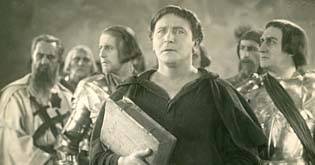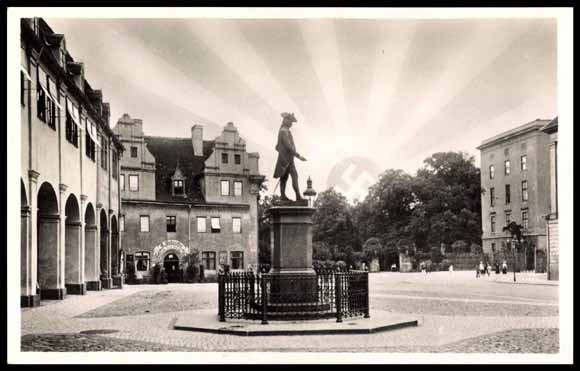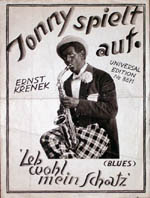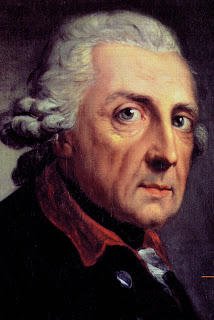Introduction
The focus here is not on Jews or Marxism or the Underman, although all are mentioned. Rosenberg here is focused on the fact that Capitalism is destructive to the national ethos. This seems to be a more fundamental problem than Jews, Marxists, and the ascent of the Underman. This essay is about how the Germans must straighten out their own ethos.
Rosenberg says that the Germans must get back their sense of honor, if they are to survive as a people. The honor to which Rosenberg refers includes unwillingness to suffer grievous insults and unjust treatment of one’s folk. Where Rosenberg uses the term German-consciousness (Deutschbewußtsein) it amounts to a synonym for honor.
When pursuit of money becomes the highest value, it undermine the sense of nationality and the sense of honor. Rosenberg sees Capitalism as thus preparing the way for the rule of the Underman. Furthermore, he sees the Social-Democrats as deliberately using Capitalism for that purpose.
With a quote from Frederick the Great, Rosenberg implies that the corrosion of national honor under Capitalism was what had induced Germany to accept a highly unfavorable armistice in 1918. After that, the attack on national honor was continued with more direct means, such as inflicting guilt for alleged war-crimes, and presentation of entertainment that humiliates the nation.
There is a significant parallel here with what has happened since the United States’ ignominious retreat from Vietnam. We too need to change our way of thinking.
Paragraphs 1-5: On the symbiosis of Marxism and Finance that brought Germany to ruin, and the mendacity of newspapers.
Germany’s Future:
Alfred Rosenberg
One can perhaps accept such admissions with some humor. Nevertheless we must state that it is an insolence beyond compare that in a city where this problem was fought and battled eight years ago[2] under the eyes of the editorial staffs of the biggest newspapers, only today is it announced in this newspaper that something of that sort occurred. This is only one example among thousands of how the so-called national upper class of the folk and the so-called “major media” behave toward vital questions, and how they try to silence every new rising power as soon as it touches a problem that hitherto was considered off-limits. Here in Munich hundreds upon hundreds of gatherings have taken place; every day our newspaper struggles to enlighten the public about questions that here in the Münchener Neueste Nachrichten are supposedly being revealed now for the first time.[3]
 |
| Moltke the Elder |
In this regard we must declare that even we, who struggle as a people’s movement for this enlightenment, are not the first to illuminate this relationship between Marxism and Capitalism. We know thanks to those Germans of the past who already indicated these things with a prophetic eye: there was the great Moltke, who, seeing the dress-rehearsal for the Bolshevik Revolution, the Paris Commune, declared openly in the Reichstag that the Paris Communards had stormed the small businesses while the palaces of the Rothschilds were protected by special garrisons; meanwhile Eugen Duehring and Paul de Lagarde were lonely prophets who did not reach the mass of the people. Only now our age is called to bring their names again to honor. But even the leaders of the Social-Democracy have known very clearly not only today but since decades ago what a close relationship their movement had to those powers that today rule the entire world. In the year 1903 the big capitalist and Social-Democrat Paul Singer[4] proclaimed in the Reichstag with open cynicism that the Social-Democratic Party would protect the stock-exchange in order thereby to hasten the social revolution. Marx declared that he supported free trade because it would cause the social revolution to erupt[5].
The leaders knew very clearly that the stock market and its capital represented a subversive element in national and economic life. On 9 November 1918 came the test of whether these arrangements had been understood merely as ways to undermine the old system. The Social-Democratic leaders did not impose a heavy tax on the stock market, which they knew to be subversive; rather they proclaimed brotherhood with it before the entire people. The Berliner Tageblatt[6] today can dare before the eyes of millions of workers to call Herr Scheidemann[7] a friend and comrade in the common struggle. In fall 1924 the Vorwärts[8] ventured, as the abhorrent Dictate of Versailles was hung over Germany on behalf of stock-finance, to present the rising sun[9] and the dollar-sign together, and proudly to proclaim that this development lay in the evolution of Social-Democratic politics. Since that day German workers and the German people have labored and paid eight million goldmarks per day for the satisfaction of these brothers and friends of Social-Democracy.
If earlier some great men had indicated the danger of the undermining of German-consciousness, they nonetheless did not reach the people with it. After 9 November 1918, in the midst of the deepest catastrophe of the German people, arose the uneasy question of how this collapse was possible, and which powers had had a part in it. The feeling was in the air even in small and middle-sized cities at that time, but nowhere more clearly and consciously than in Munich, that this collapse could not have been an accident, not a military failure, but was the consequence of a movement consciously directed, determined by instinct, and pushed for decades.
If today we look back on our eight years of struggle, we are entitled to say that eventually it will be designated a political miracle that, in the midst of the deepest catastrophe of a people, its most conscious element picks itself up undiscouraged so as to go about constructing a new state based on a new theory of government [Staatsgedanken]. Everybody sensed at the time that we were living in one of those periods when the old [order] was shattered, the old society reduced to rubble, and old traditions had to give way to new ideas of life, and we have sensed looking back that, while such epochs of revaluation have often occurred in our contemporary history, like deep chasms separating different ways of life, nonetheless an essential difference exists between the past and the present.
Today we stand before the fact that all powers of the Underman have been set free so as to destroy [vernichten] the last substance, in moral and racial regards, of Germandom. The 9th of November 1918 signified the rising of the yeast, the ferment of the scum that is present in every people, which through envy and high treason seizes power, and today this less-valuable Underman rules over the valuable forces of the German people.
In what manner all racial and moral values of the German nation today are being deliberately buried, we can observe daily in the Berlin press, in Berlin’s weekly newspapers and monthly magazines, whose assault is directed no longer as previously against certain externalities; instead, at stake are the deepest and greatest values that in general have sustained the German people. We can see that in the Jewish-run “international newspapers” the German officer corps is depicted as a cesspool of the nation, and that it is very often said: beat the German officer corps to death; only then is room created for a German culture. In the Jewish Weltbühne (World Stage) Ignaz Wrobel[10] calls German soldiers “patriotic asses, brutal death-officers, and progeny of a Ludendorff … beastly soldiers, bulldogs and sergeants of the Kaiser’s army.” By no German court has this man been brought to account; he was the Paris correspondent of the Vossische Zeitung[11].
Notorious traitors to our country sit on kangaroo committees of inquiry and judge whether German soldiers in dire straits had shot spies before the court could get involved. We witness the remarkable fact that in all these “kangaroo murders” it is not investigated whether the one shot really was a spy or not. We see it as a deliberate trampling of the national sense of honor when men who have bled from sixty-four wounds are later locked up as “kangaroo murderers” in cells where previously a sex-killer sat.
Those are the signs that consciously and deliberately, day by day, something of the core of the nation is being eroded in order to destroy it so that in the future resistance will be no longer possible. A former president of the Senate, Baumbach, says that today justice has become the maidservant of politics. This statement is consistent with the brutal frankness of the National-Socialists. And if we ask ourselves, how is it possible that today all German values are thus trampled underfoot, we must answer: Because we have forgotten that without the idea of honor no folk can exist.
Today we stand before the fact that the highest values of Germandom are no longer present in the life of the state and in the administration of justice. The Germanic legal system developed from self-help to the honor of the clan and to the honor of the tribe, and then the defense of honor was taken over by the state, which bears legitimacy to the degree that it is able to defend the honor of a totality. We can see that an insult to Germandom could be prosecuted by a government attorney. We can also see that the Weltbühne is able to speak of a “Whore Germania” without anyone lifting a finger to seize this lad by the collar. That is the deepest calamity that a people can experience.
Nevertheless on 9 November 1918 in thousands of Germans something new came to life, and the highest value arose, which should bind us all together today. Here for the first time was born that which appears to us today as the highest and holiest: a racial and type-based folkdom.
This worldview led us not only to contemplate today’s situation under a new illumination, but also to view history in a different light. Thus we see that the frequently mentioned Light from the East has faded, that all culture-creating deeds have progressed from West to East, and it is certain that before the Germanic peoples founded all the states of Europe, quite long before that, Nordic waves went over the Alps to Rome, Greece, Persia, and India,[12] where racially characteristic cultures and racially characteristic art arose, and that only the Germanic Eveningland ever created similar values again, although in new forms.
For the National-Socialist movement two fundamental demands derive from that: the unconditional vigorous defense of the race and the unconditional defense of national honor. The former is the physical substance, the latter the innermost value. What economic program and political possibilities will result later, no man can know. Ultimately it is not programs that we want to cultivate. At the beginning and end of the National-Socialist movement stands the Germanic person, outwardly healthy and inwardly valuable. From this fundamental awareness again two other demands result: active nationalism, which means the securing of the entire territory against hostile neighbors, the protection of seventy-million Germans amid the various races and peoples of Europe, and in another direction, a just-as-active socialism, which means securing the individual against any exploitation by private powers.
Nationalism pertains mainly to foreign policy while socialism is the domestic complement. Corresponding manifestations are the army and the police. We want to bring together the two currents that splash around the middle, the strongly nationalist movement and the strongly socialist movement purged of Marxism. Therefore National-Socialism distinguishes itself from the religion of the Second Reich — from National-Liberalism — which is distinguished on the one side by unlimited exploitation, on the other by charity. On one side the ladle of finance scoops away small savings; on the other side nursing homes and hospitals appear. This is most evident today in America, where exploitation has already become a condition that is encouraged. The stock-jobber who has robbed a people for 60 years, in the 65th year builds a hospital for his victims.
Against this age led today by Marxism we have declared a struggle to the end. National-Socialism clearly distinguishes itself in terms of worldview, and cultivates personality in the knowledge that it is soil-bound and race-bound, and that its ultimate goal is service to the organism of the folk [Volksorganismus]. If somebody declares to us that the German should sacrifice himself for the great European Idea, we declare that all Europe could go to ruin if the German folk must suffer harm.
Whenever such thoughts are pronounced, then come the Men of Darkness [Dunkelmänner] from all camps and say, That is idolatry of the nation. They, who today have only one idol, their party and their moneybag, who look on daily as all German values are trampled in the mud, dare to proclaim that. Indeed while the film about Luther was banned, the same ministry declared that it found no reason to ban the Negro opera Jonny Spielt Auf (Jonny Strikes Up). This disgraceful Black piece is being presented at sixty German opera-houses. It culminates in the glorification of the Negro atop the globe carrying the stolen violin of a German, and at his side an Aryan girl that has been raped [ein vergewaltigtes arisches Mädchen].
 |
||
| Luther (1928) with Eugen Klöpfer, was banned by the Weimar Republic. |
Several weeks ago a wonderful book appeared, the Briefe (Letters) of Houston Stewart Chamberlain, that great man, to whom we owe a fine interpretation [Weltbild] of our history, and who at the end of his life strongly supported Adolf Hitler. We see that this tireless fighter for Germany’s honor and greatness knew precisely the weakness up in the diplomatic classes, and with a bleeding heart how he complained that, while strong personalities were creatively active in all fields, nonetheless in the upper classes a decadence prevailed that could result in catastrophe. “The day is approaching,” he wrote, “when that society will be swept away. By what method this will happen, I know not, but it must be and it will therefore be.”
The National-Socialist movement will always acknowledge that the point of origin already contained within it all possibilities for the future. It cannot be otherwise. If one pursues a definite direction from the start and beholds the vision of a new state, one will be able to find many fine things along the way. But fulfillment remains already determined in the point of origin, in the preservation of the type-based folk, in the preservation of those character-values that for millennia have been fruitful everywhere that Germanic life determined them. If all great men of the German past — Bismarck, Freiherr vom Stein, Lagarde — could look down on this honorable, character-filled struggle that our movement has been conducting for eight years, they would bless this movement. Frederick the Great, in the greatest need after a lost battle, once wrote the following words:
“Never will I experience the moment that would compel me to conclude a disadvantageous peace. No speech, however clever, will bring me to the point of undersigning my disgrace. I will either have myself buried among the drummers of my fatherland, or, if Destiny, which persecutes me, begrudges me even this consolation, I myself will make an end to my misfortune, if it will be no longer possible for me to endure it.”
And true to the legacy of the greatest German king, we National-Socialists say: Never will come the time when we would make a shameful peace with the honorless worldview of Democracy and of Marxism. Better to pack up the whole movement than to submit. If today one speaks of a German united front, we recognize that it means the National-Socialist German Workers’ Party.
______________________
1. The Süddeutsche Monatshefte (South-German Monthly) was a monarchist periodical that was unfriendly toward the NSDAP but shared with the NSDAP the views that Germany had not been guilty for the war and had lost due to a “stab in the back.”
2. Rosenberg here refers to the short-lived “Bavarian Soviet Republic” (April-May 1919) which was quashed by the Freikorps and still-loyal elements of the German Army.
3. The dominant political party in 1920s Bavaria, the Bayerische Volkspartei (Bavarian People’s Party) represented views similar to those of the Süddeutsche Monatshefte. The editors of the Münchener Neuesten Nachrichten may have suddenly realized in 1928 that it behooved them to treat those views with some respect. The fact that the ban on Adolf Hitler’s participation in politics had ended the previous year may or may not be relevant.
4. Paul Singer (1844-1911) was a Jew prominent in the Sozialdemokratische Partei Deutschlands in the late 19th century, even during the period when it was banned.
5. “But, in general, the protective system of our day is conservative, while the free trade system is destructive. It breaks up old nationalities and pushes the antagonism of the proletariat and the bourgeoisie to the extreme point. In a word, the free trade system hastens the social revolution. It is in this revolutionary sense alone, gentlemen, that I vote in favor of free trade.” (Karl Marx, Discours sur la Question du Libre Échange, Brussels, February 1848; this passage is found in Florence Wischnewetzky’s1888 English translation on page 42. )
6. The Berliner Tageblatt (Berlin Daily Paper) (1872-1939) was primarily a newspaper catering to business.
7. Philipp Scheidemann (1865– 1939) was a prominent Social-Democrat who proclaimed what came to be known as the Weimar Republic on 9 November 1918, following the abdication of Kaiser Wilhelm II, which had been expected to lead to the accession to the throne of one of his grandsons. The declaration of the republic was Scheidemann’s own unilateral decision. When the NSDAP came to power in 1933, Scheidemann left Germany.
8. The Vorwärts (Forward) was the official newspaper of the Social-Democratic Party.
9. The rising sun was a symbol used by the Social-Democratic Party. The NSDAP did not fail to subsume this poweful symbol into its own propaganda, placing a swastika on the sun.
10. Ignaz Wrobel was a pseudonym of Jewish journalist Kurt Tucholsky.
11. The Vossische Zeitung (Voss Times) (1721–1934) was a previously venerable Berlin newspaper of the liberal bourgeoisie that was perceived after the First World War as not very patriotic.
12. To say that Aryan man passed “over the Alps to Rome, Greece, Persia, and India” is a bit different from the late twentieth century’s mainstream scholarly view of where the original Aryan homeland was and the routes that the Aryans took on their way to creating those cultures. There is however some evidence that the Aryans could have originated in Northern Europe. The greatest concentration of blonds in the world is in Sweden and Finland, and the modern language that most resembles the theorized original Aryan language is only a short distance away, in Lithuania. Only the route to Rome is likely to have involved crossing the Alps.


